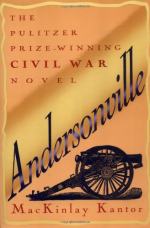The entire grounds are surrounded by a frail board fence, and are strictly guarded by Confederate soldiers, and no prisoner except the paroled attendants is allowed to leave the grounds except by a special permit from the Commandant of the Interior of the Prison.
The patients and attendants, near two thousand in number, are crowded into this confined space and are but poorly supplied with old and ragged tents. Large numbers of them were without any bunks in the tents, and lay upon the ground, oft-times without even a blanket. No beds or straw appeared to have been furnished. The tents extend to within a few yards of the small stream, the eastern portion of which, as we have before said, is used as a privy and is loaded with excrements; and I observed a large pile of corn-bread, bones, and filth of all kinds, thirty feet in diameter and several feet in hight, swarming with myriads of flies, in a vacant space near the pots used for cooking. Millions of flies swarmed over everything, and covered the faces of the sleeping patients, and crawled down their open mouths, and deposited their maggots in the gangrenous wounds of the living, and in the mouths of the dead. Musketos in great numbers also infested the tents, and many of the patients were so stung by these pestiferous insects, that they resembled those suffering from a slight attack of the measles.
The police and hygiene of the hospital were defective in the extreme; the attendants, who appeared in almost every instance to have been selected from the prisoners, seemed to have in many cases but little interest in the welfare of their fellow-captives. The accusation was made that the nurses in many cases robbed the sick of their clothing, money, and rations, and carried on a clandestine trade with the paroled prisoners and Confederate guards without the hospital enclosure, in the clothing, effects of the sick, dying, and dead




